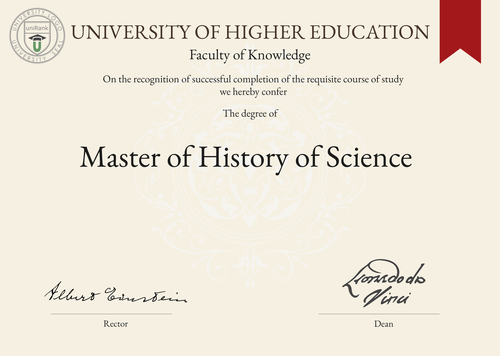
Master of History of Science (MHS)
Guide to Master of History of Science Program/Course/Degree
Master of History of Science (MHS)

Program Name
Master of History of ScienceProgram or Degree abbreviation
MHSDuration range
The duration of the Master of History of Science program typically ranges from 1 to 2 years, depending on the university and country.Tuition range
The tuition fees for the Master of History of Science program can vary significantly based on the chosen country and university. It is recommended to check with specific institutions for accurate information.Overview
The Master of History of Science program is designed to provide students with a comprehensive understanding of the development and impact of scientific knowledge throughout history. It explores the historical, social and cultural contexts in which scientific discoveries have been made and examines the evolution of scientific theories and methodologies.Curriculum Overview by year
The curriculum of the Master of History of Science program is typically structured to cover various aspects of the history of science. The specific courses and their order may vary depending on the university. However, a typical curriculum may include: Year 1: - Introduction to History of Science - Scientific Revolutions and Paradigm Shifts - History of Medicine and Healthcare - History of Technology and Innovation Year 2: - Science and Society - Philosophy of Science - Research Methods in History of Science - Elective Courses (e.g., History of Biology, History of Physics)Key Components
The key components of the Master of History of Science program include: - In-depth study of the history of scientific ideas, discoveries and advancements - Analysis of the social, cultural and philosophical contexts of scientific development - Research and critical thinking skills development - Exploration of the relationship between science and societyCareer Prospects
Graduates of the Master of History of Science program can pursue various career paths. Some potential career prospects include: - Academic research and teaching positions - Museum and archival work - Science journalism and communication - Policy analysis and consulting - Cultural heritage managementSalary Expectations
Salary expectations for individuals with a Master of History of Science degree can vary depending on factors such as job position, location and level of experience. It is recommended to research specific career paths and industries for accurate salary information. For a more accurate understanding of salary expectations, you can utilize the Job Sites Search Engine, from our sister site jobRank, which searches over 4,600 job sites worldwide. Make sure to specify not only the job title but also the country you are interested in.Conclusions:
It is important to note that the duration, tuition fees, curriculum, key components, career prospects and salary expectations of the Master of History of Science program can vary based on the chosen country or location of study, as well as the university offering the program. Prospective students are advised to thoroughly research and compare different institutions and their offerings. Visitors can search for where this specific degree, Master of History of Science, is offered anywhere in the world through the uniRank World Universities Search Engine.World Universities Search Engine
search for Master of History of Science (MHS) and add the Location (country, state etc.) or specific University you are interested in studying at.
Query examples:
- Master of History of Science (MHS) United States
- Master of History of Science (MHS) United Kingdom online
- Master of History of Science (MHS) Australia international students
- Master of History of Science (MHS) University of California
- Master of History of Science (MHS) University of London tuition fees
- Master of History of Science (MHS) University of Sydney scholarships
Share Program/Course
Interesting? Share this program/course/degree info with your friends now.